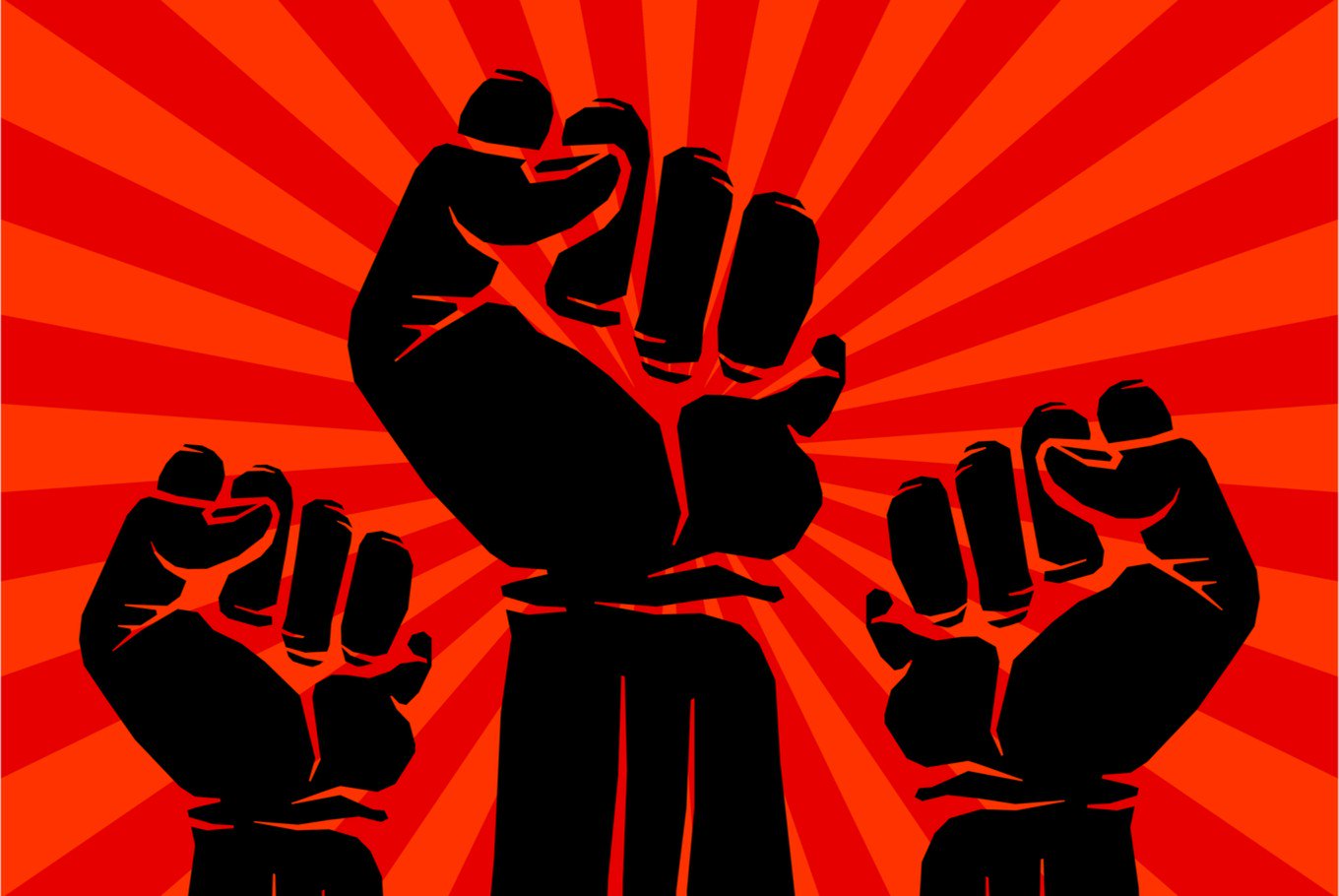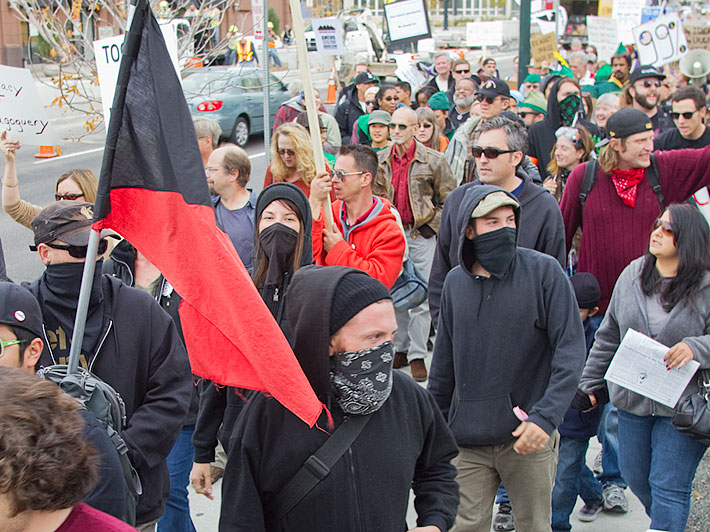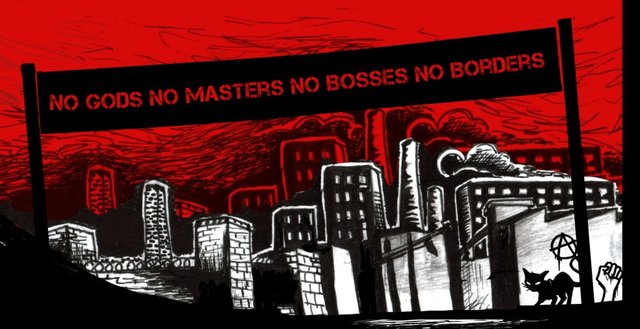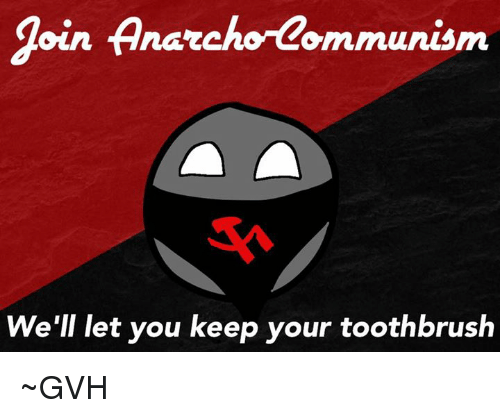When Anarchists Aren't Really Anarchists: Understanding the AnCom World View

It is an unfortunate truth that most people who self-label as "anarchist" are actually totalitarians of one stripe or another.
This mislabeling occurs with both right and left "anarchists", but for this post I'll focus on those on the left, specifically the anarcho-communist.
I define a true anarchist as one who believes that individuals own themselves and that all human interactions should be voluntary. This means that people should be allowed to do as they wish with their person and property, as long as they are not using force or coercion against others. Another word for this philosophy is voluntaryism. The voluntaryist imperative of individual freedom holds true even when others do things with their person or property that we don't agree with or find reprehensible. As long as they are not initiating force against other individuals, we have no right to intervene with their activity.
Before going on, I'll note that there are some true anarchists, or voluntaryists, who like the idea of communism, and who favor it as their preferred economic system. Though few and far between, these anarchists believe that human equality and sharing are noble goals to strive for, and that doing things for monetary profit is not necessarily the best way to live your life. The difference between these types of anarchists and anarcho-communists is that the former allow that it is okay if others do not agree with them, and choose to live their lives making profit and participating in a capitalist economy.
In order to effectively argue against a bad idea, you must first evaluate the idea and try, as much as possible, to understand it as it is understood by the person who genuinely holds it as truth. So for most of the rest of this post, I'm going to explain anarcho-communism as I believe it would be explained by an anarcho-communist. The ancom rhetoric will appear in regular text, and my own commentary will appear in italics.

"Anarcho-Communism is totally different from state communism."
Whereas most of the well-known communist experiments in history were enforced through a state, actual communism, or "anarcho-communism", will be completely stateless. Money, profit, and property (apart from personal property) will be abolished. People will live in voluntary communes and everyone will do the work they enjoy doing, and have all of their needs voluntarily taken care of by society, regardless of whether or how much they produce. Everyone will be equal and no one will be able to exploit another's labor for their own personal gain.

But how will this ideal society be achieved? Many people (perhaps most) have no problem with money, profit, or property. In fact, most people probably want to keep their property and have the option to make profit with their labor or investments. In the absence of a state to force everyone to live in communes and exist without money, how will such a system be organized?
"Most people will agree that this is the best way to organize society, and will voluntarily transition into the anarcho-communist system."
Workers make up the vast majority of the world's population, and workers are the most oppressed and exploited class of people on earth. Once they realize that they can be free and have all of their needs met under true communism, they will voluntarily (and happily) accept the new system, even if it means giving up some of their property. When faced with the choice between slaving away at a nine-to-five for the rest of your life or being able to make art and have all your needs met just by virtue of existing, most will choose the latter.
But what about those who choose not to give up their property, who persist in trying to run businesses for profit, or who simply have no interest in joining a commune and being taken care of by "society"?
"They will have to be forced." OR "They will eventually come around, after they realize no one else wants to buy things from them or work for them anymore."
And if they don't, they will be outcast from society. That's the price you pay for opting out of the voluntary system.
Well then, it's not voluntary, is it? Anyway, who is going to do all the necessary work to keep society running and provide all of those necessities for everyone, if there is no monetary incentive to do so?
"Many of the tasks for which we currently use human labor can be more efficiently performed by automation. For those tasks that cannot be automated, individuals will perform out of a desire to see the society flourish."
One thing that would be different in an anarcho-communist society is that fewer people would specialize. Everyone would know how to do things like gardening, digging ditches, plumbing, etc. When a need in the local community arises for labor, people will voluntarily sign up to do it. Everyone will have their basic needs met regardless of whether they work or not, but those who do perform needed tasks for the commune or larger community will enjoy the appreciation and esteem of their peers. They will be rewarded with a sort of social currency, while people who don't work may be shunned to some extent.
It's important to acknowledge that no type of labor has any more or less value than any other type of labor. The work of the potter is just as valuable as the work of the doctor. A playwright who spends two thousand hours producing a play should receive the same compensation as a researcher who spends two thousand hours producing the cure for cancer. And just because someone is less competent at their work than another, doesn't mean that they should be compensated less. A carpenter who builds a shoddy house has just as much right to feed himself and his family as a carpenter who builds a sound house.
Without economic specialization or a pricing mechanism, how will people know what to produce or how much? For instance, in our current free-ish market, people choose to go into specialties based on a number of factors, one of which is "how much money can I make in this field". The amount of money to be made in a field generally indicates how much demand there is for that type of work. Without pricing of goods and services, how will labor and resources be adequately distributed?
"A supercomputer will figure it out." OR "A democratic advisory board will evaluate need and allocate resources."

What if someone tries out the anarcho-communist society, renouncing money and property, and then decides it's not for them? Can they then begin to use money, accumulate property, sell items for a profit?
"No. Property is theft, profit is exploitation, and money is oppression."
It's a common misconception that ancoms' prohibitory attitude against property extends to everything a person can possibly own, right down to their toothbrush. This isn't true. When we say "property is theft", we mean the means of production, not personal property. But you can only own what you actually use. Your toothbrush, clothes, and bicycle fall into the category of personal property. Other things, like land, houses, and machines that produce things would fall into the category of communal property, owned by all and used for the good of all. It would not be acceptable to own two houses and rent one out, or to own a piece of land that stays vacant. Things like tools and computers that are not used on a daily basis as part of your labor contribution should be commonly owned and kept in community libraries, to be "checked out" whenever someone has need of them.

Who will prevent dissatisfied individuals from using money, accumulating property, or starting businesses for profit?
"Society." OR "The Commune." OR "A Democratic Advisory Board."
What is the difference between a state authority and the authority of the commune or a democratic advisory board?
"The commune has everyone's best interests at heart and its edicts derive from the will of the people, rather than from some out of touch, exploitative, elitist pigs."
Okay, but what is the difference to the individual who is forced to abide by the edicts? It sounds to me like the same thing. An individual must submit to the will of the state on the one hand, or of the majority on the other. Either way, it's tyranny.
(At this point, the conversation usually turns to circular argumentation.)
There you have it. I've tried my best to outline what anarcho-communists believe, using their own language and avoiding conflations as best I can. Your critiques are welcome! If you think I've gotten anything wrong or missed anything, please let me know in the comments.

Hi, I'm Starr!

I'm a self identified anarchist.
The old saying is..."Either Lead, follow or get out of the way."
Yup...anarchists neither lead nor follow..but if we were here first it's up to you to go around.
Good fences make good neighbors and a border is just a gated community.
The Zero Aggression Principle says.
Don't start a fight..but finish the one's you can't avoid.
I'm a pacifist...a heavily armed one.
I agree with everything you said except "a border is just a gated community."
I think that's only true if all the people who own property along the border agree to have the border.
they did.
it's part of the deed.
That was an interesting read.
There are quite a lot of wo coops who's members I would imagine identify as voluntarist or anarchist.
There are just so many shades of peoples thinking, which is probably a good thing
An excellent article; thank you.
My only quibble is with this part:
If "outcast" simply means widely boycotted and ostracised – i.e., "no one else wants to buy things from them or work for them anymore" – then isn't that simply the communists exercising their freedom of association? No one has a right to sell to unwilling buyers, or to hire unwilling employees, even if their victims are communists.
Does this amount to the communists punishing people for noncompliance? I'd argue no: technically, they're rewarding people for compliance. I'm no worse off for them doing this than if they simply didn't exist. I can ignore them completely and they won't interfere.
So this particular form of "enforcement" is actually compatible with the voluntaryist criterion.
It is necessary to to Anarchist to fulfill demands which are not providing by Govt. No one care you if you keep silence but if you speak that motivate thousands and help you to get you rights.
Your writing power is excellent.
So basically, an anarcho communist is either sub 80 IQ, or if anything above that, greener than the grass.
It's a good job these people have their moms to pack a lunch for them, and zip up their hoody, when they go to a protest.
Imagine how many would never return home, if GPS hadn't been invented..
I've met some highly intelligent ones. Unfortunately, there are a lot of very smart people out there who can't logic their way out of a hole in the ground. I think that's mostly due to lack of exposure to the rules of logic.
Gravity is a social construct ! 😂😂
Cool summary.
Something I've never been able to figure out from people who identify as "AnCom" (maybe you can answer on their behalf?) is:
Say I build a conveyor belt (the "means of production"), and Bob and Sally and whoever come by and use it. Eventually I pay them to make certain things. This is a problem? And it should be stopped? And what's the mechanism to stop it?
If this is "okay" in the sense that they wouldn't want to force us to stop behaving this way, then they're voluntaryists. (Even if they vaguely would prefer there weren't people building things on a conveyor belt.)
Personally I could see myself opting in to some sort of commune, along the lines of what you mentioned at the beginning. I suspect we may end up living in groups or tribes or communities of whatever manageable amount of people, and within that we share resources. But still trade and are "capitalistic" and don't blindly share with people from outside the group.
So often I like some of the things AnComs talk about (and like i.e. I think not having wage labor would generally be a natural function of a voluntary world -- it will be much more about building and creating), but I don't get the way they consider voluntaryists to be their bitter enemy or something.
It makes me less into wanting to give them the benefit of the doubt and emphasize the good when they almost never have the same attitude. Voluntaryists seem to trigger them, for some reason.
At the end of the day it shouldn't be that controversial to think that violence is bad :p I can understand why statists disagree, but I don't get why people who claim to be anarchist could have any beef with this.
I think a self-described ancom would answer that as soon as you built the conveyor belt, it became communal property. Whether that is because you (as a true believer in the principle of not owning the means of production) ceded it to the workers, or because some democratic resource-allocation advisory board members came by to confiscate it, would depend on the ancom. Another possibility is that guilt and cultural conditioning would be the motivating factor. In an ancom society that was sufficiently established and had been operating for a few generations, people might be culturally ingrained with the idea that property ownership is evil, and therefore the thought would not occur to them to keep the conveyor belt for themselves. (If you haven't read The Dispossessed, by Ursula K. LeGuin, it does a good job of carrying out a thorough thought experiment with regards to the multi-generational left-anarchist society. The society in the book is something of a mix between anarcho-communism and anarcho-syndicalism.)
I think I can explain it. Whereas ancaps generally consider anarchism to be more-or-less synonymous with voluntaryism, ancoms do not. To them, anarchism is the "logical" outcome of Marxist communism. They consider themselves communists first, and anarchists second. In fact, there is a growing trend among them to self-label as "communist anarchists" in an attempt to put the most important descriptor first. In order to reach the anarchism, they have to go through revolution and seizing the means of production and eliminating their philosophical detractors and a bunch of other steps that could not feasibly be done in a voluntary way. Also, they object to voluntaryism on the grounds that it is predicated on the concepts of self-ownership, which they believe to be impracticable, and property rights, which they believe to be unjust.
That makes sense. And then whatever I do to claim ownership on the property is me initiating the violence on the collective.
Their issue then, I think, is that it's totally subjective when specifically something can be identified as "conveyor belt" or whatever would qualify as communal property.
(When I have a wooden peg, it's fine. Maybe I can build it into a table. Maybe I can put rubber on top of it. When exactly it becomes a conveyor belt seems completely arbitrary.)
Like at the end of the day it just seems so inside out that I'd have "my" property and then as I do things with it, somewhere along the way it morphs into no longer mine because of what exactly I did with it.
That makes sense too and sheds a lot of light on their attitude.
It's always weird to me how anyone could be opposed to voluntarism, like how could that possibly grind your gears.
I guess it makes sense tho, like if you see radical force as the only way to get the outcome you want, you'd have to be.
I think often they probably project the issues in the world today onto "capitalism" and "freedom" (when really it's a function of statism/violence), and so that's how they end up with this backwards view that they need to be violent and coercive in order to make things peaceful and egalitarian.
Really they should just shun the violence that currently exists.
Thanks for your answer.
What an interesting alalysis about anarchists, Another amazing article as usual...